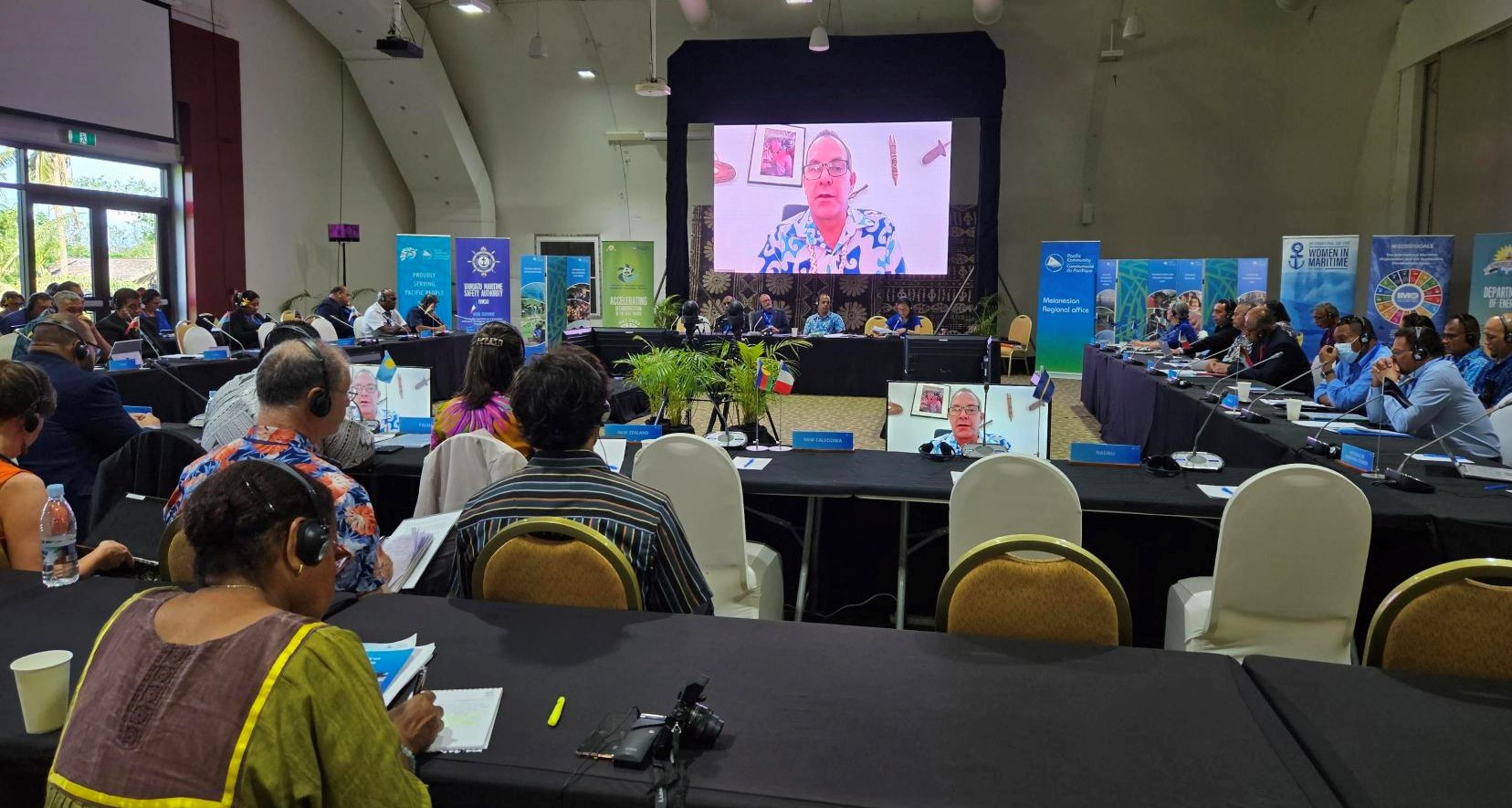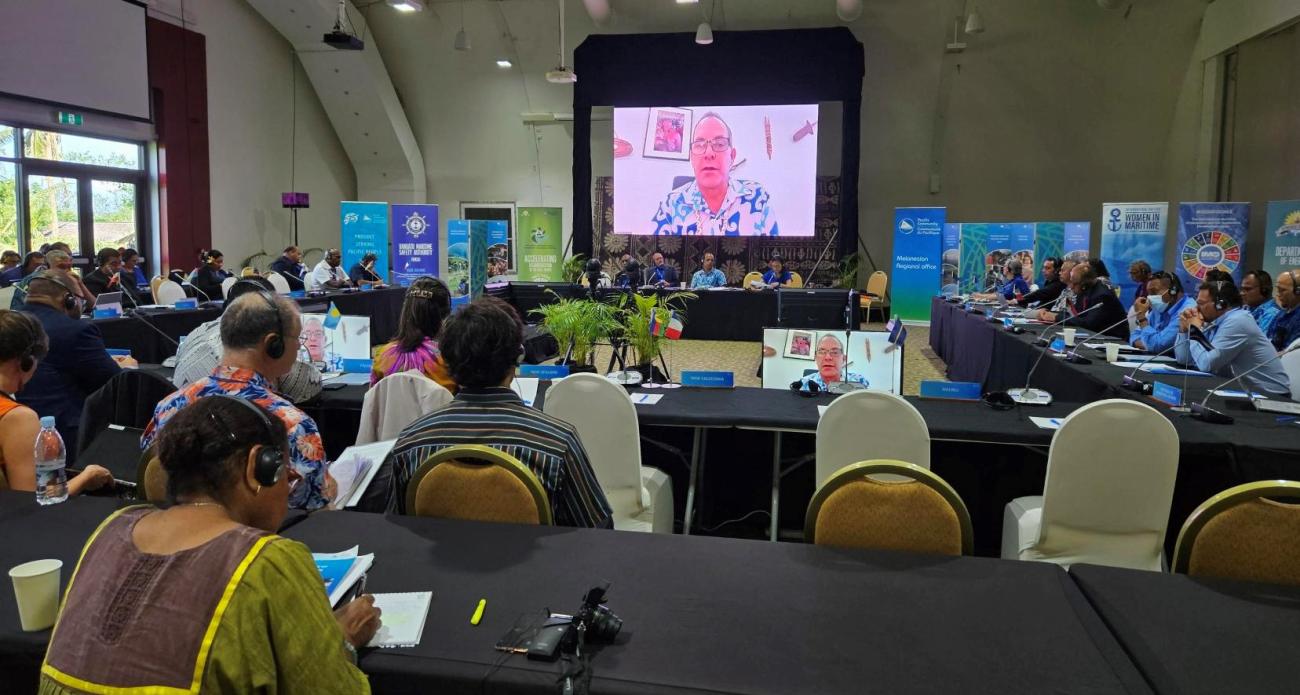
Prime Minister of Tonga Honourable Hu’akavameiliku (Siaosi 'Ofakivahafolau Sovaleni)
Vice President Honourable Paino Vanai, Wallis and Futuna
Deputy Prime Minister and Minister of Energy and Transport of the Cook Islands Honourable Robert Tapaitau
Deputy Prime Minister and Minister of Infrastructure Development of Solomon Islands Honourable Manasseh Maelanga
Minister of Climate Change, adaptation, meteorology, geo-hazards, energy, environment and disaster management for Vanuatu, Honourable Ralph Regenvanu
Minister of Infrastructure and Public Utilities for Vanuatu, Honourable Marcellino Barthelemy
Honourable Ministers,
Your Excellencies,
Distinguished Delegates,
Development partners and donors,
The Pacific Community Team or SPC,
Ladies and Gentlemen,
Good morning yufala everyone and bonjour.
I humbly join you virtually from New Caledonia with a deep regret that I am unable to physically be in the meeting with you.
Firstly, I would like to extend sincere gratitude to the Vanuatu Government for hosting the 5th Pacific Regional Energy and Maritime Ministers Meeting and your leadership over the coming days.
Thank you, Ministers and your teams, for the many months of work and dedication with our SPC team to ensure this Ministerial meeting is a successful and collective dialogue that drives genuine action. I think I speak on behalf of everyone in this room as I also express my sincere gratitude to Australia and Aotearoa New Zealand for their generous funding which has made this meeting possible.
It is no secret that we must accelerate our efforts towards decarbonisation of energy and transport whilst also driving genuine and equitable access across our Pacific region.
As your member-owned and led organisation, the invaluable work of the Pacific Community (SPC) in the realms of energy security and maritime transport is one that is helping progress your priorities at national and regional levels.
But we also recognise we can’t do this alone.
So what is the reality we are facing when we talk practicalities of energy and transport in our region?
To date, the reality is our region is reliance on fossil fuels for our energy needs.
The fossil fuels we import make up 80 per cent of the region’s total energy supply and almost 100 per cent of our transport sector is still powered by fossil fuels.
Today, we need to discuss what it will really take to both decarbonise our sector and unlock resourcing to increase access to those in our communities that still lack access to regular power supply and safe, sustainable maritime transport services.
We face an unprecedented challenge – the urgent need to address climate change and its catastrophic consequences whilst also ensuring we increase access to those without energy in our region and driving sustainable and cost-effective maritime transport for all.
As Ministers sitting in this room, you hold the key to both our energy and maritime transport future. These are two pillars critical to our Pacific identity, essential for our economic growth, connectivity, and the well-being of all our communities.
However, if we don’t drastically accelerate decarbonisation in the next decade our economies and people will be left paying the price.
This impact and cost would undermine our Pacific economies and sustainable development aspirations as a prosperous, healthy, and deeply rich Pacific region.
The Pacific Community (SPC) has been instrumental in leading the charge towards a cleaner, and greener Pacific.
Through our energy programmes, we have spearheaded the testing and development of renewable technologies such as biogas and solar whilst working with partners to understand the science and application of new energy sources such as green hydrogen, ocean energy and geothermal feasibility studies.
We have done this with you and your respective teams and with the partners that are here in the room today and we thank you for this however we must find ways to ensure this can drastically and practically scaled up towards energy independence.
SPC’s work in maritime transport has also been transformative. It has championed the development and implementation of sustainable and safe shipping practices, promoted and tested energy-efficient vessels. The Pacific Community also plays a critical role in facilitating regional cooperation, women in energy and women in maritime engagement, partnerships to improve maritime safety, protection of our fragile ecosystems, and reduction of carbon emissions from shipping and port services.
Right here in Vanuatu, our team have been working with government and private sector to test solar marine PV systems that have reduced the boat operators' cost by 3.6 billion vatu equating to about 45,000 Australian dollars per annum and reduced greenhouse gases from one inter-island barge by about 226 tonnes per annum.
To help understand what this really means with one intervention – this is equivalent to the yearly emissions of 50 passenger cars1.
However, there is much more work to be done and we can’t do it in silos.
The urgency of the climate crisis demands that we accelerate our collective action whilst recognising 64% of Pacific people still lack access to 24-hour electricity and more than 50 per cent of our population live in outer island environments.
Access to regular power, access to safe and sustainable shipping and decarbonisation must be our collective goals.
One-point-five to stay alive is important and agreed and now we must progress towards making this a reality and ensuring energy and transport independence for Pacific people - before the cost of fossil fuels further impacts our economies.
Our ask is that we need partners to listen to the region, to invest in maritime safety while still driving decarbonisation efforts.
We need resources both human and financial to train Pacific people on energy transition and renewable technologies that are fit-for-purpose for those without access and in remote areas and outer islands.
We must renewably electrify our transport and energy sector more broadly, but we must do this with consideration of waste management.
And most importantly we must build resilient access to ensure that energy progress and maritime solutions withstand the increasing disaster risk and impact of a changing climate.
We must act now before we are left holding the cup of fossil fuel that cripples our economies.
Honourable Ministers, the Pacific Community as your organisation has collectively worked with you to show us the path forward – a path towards a prosperous and resilient future.
Let us heed its call, accelerate our action, decarbonise our energy and maritime sectors and ensure that every Pacific person has access to power, safe transport services and employment opportunities that will drive this change.
Tankyu tumas and I look forward to the robust Ministerial Storian and dialogue over the coming days.
